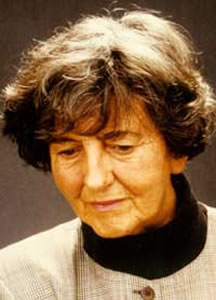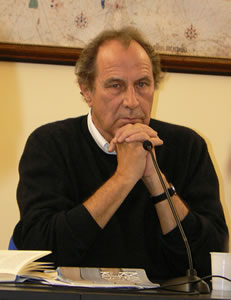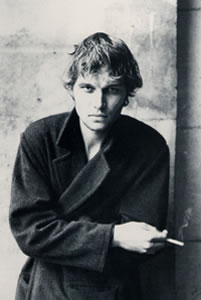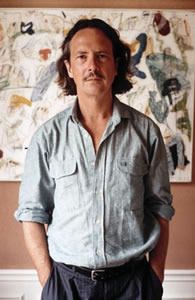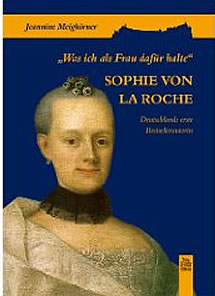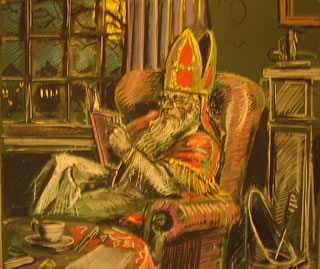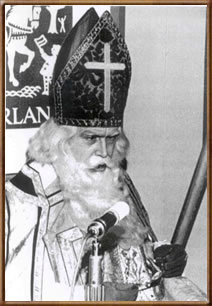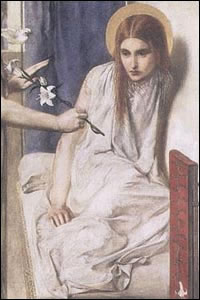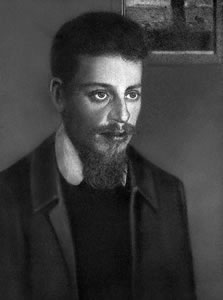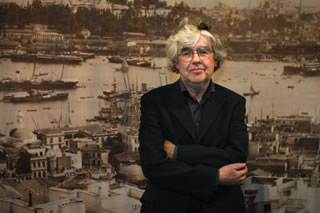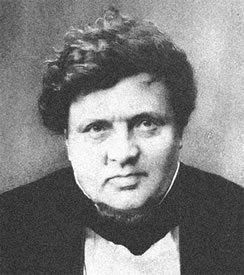De Duitse dichter Heinrich Heine werd geboren in Düsseldorf op 13 december 1797. Zie ook alle tags voor Heinrich Heine op dit blog.
Aus einem Brief
Die Sonne spricht:
Was gehn dich meine Blicke an?
Das ist der Sonne gutes Recht,
Sie strahlt auf den Herrn wie auf den Knecht;
Ich strahle, weil ich nicht anders kann.
Was gehn dich meine Blicke an?
Bedenke, was deine Pflichten sind,
Nimm dir ein Weib und mach ein Kind,
Und sei ein deutscher Biedermann.
Ich strahle, weil ich nicht anders kann,
Ich wandle am Himmel wohl auf, wohl ab,
Ass Langeweile guck ich hinab –
Was gehn dich meine Blicke an?
Der Dichter spricht:
Das ist ja eben meine Tugend,
Daß ich ertrage deinen Blick,
Das Licht der ew’gen Seelenjugend,
Blendende Schönheit, Flammenglück!
Jetzt aber fühl ich ein Ermatten
Der Sehkraft, und es sinken nieder,
Wie schwarze Flöre, nächt’ge Schatten
Auf meine armen Augenlider…
Chor der Affen:
Wir Affen, wir Affen,
Wir glotzen und gaffen
Die Sonne an,
Weil sie es doch nicht wehren kann.
Chor der Frösche:
Im Wasser, im Wasser,
Da ist es noch nasser
Als auf der Erde,
Und ohne Beschwerde
Erquicken
Wir uns an den Sonnenblicken.
Chor der Maulwürfe:
Was doch die Leute Unsinn schwatzen
Von Strahlen und von Sonnenblicken!
Wir fühlen nur ein warmes Jücken,
Und pflegen uns alsdann zu kratzen.
Ein Glühwurm spricht:
Wie sich die Sonne wichtig macht,
Mit ihrer kurzen Tagespracht!
So unbescheiden zeig ich mich nicht,
Und bin doch auch ein großes Licht,
In der Nacht, in der Nacht!
Der Wind zieht seine Hosen an
Der Wind zieht seine Hosen an,
Die weißen Wasserhosen!
Er peitscht die Wellen, so stark er kann,
Die heulen und brausen und tosen.
Aus dunkler Höh’, mit wilder Macht,
Die Regengüsse träufen;
Es ist, als wollt die alte Nacht
Das alte Meer ersäufen.
An den Mastbaum klammert die Möwe sich
Mit heiserem Schrillen und Schreien;
Sie flattert und will gar ängstiglich
Ein Unglück prophezeien.

Heinrich Heine (13 december 1797- 17 februari 1856)
Standbeeld in Düsseldorf
De Angolese schrijver José Eduardo Agualusa werd op 13 december 1960 in Huambo geboren. Zie ook alle tags voor José Eduardo Agualusa op dit blog.
Uit: Ein Stein unter Wasser (Vertaald door Inés Koebel)
“ Brief an Ana OlímpiaQuinta da Saragoça, Juli 1877
Geliebte!
Ich habe die Insel Cajaiba gekauft, da ich Dir, wenngleich nicht das Paradies, so doch zumindest einen vorübergehenden Zufluchtsort bieten wollte, und als wir im Mai auseinandergingen, dachte ich noch, das Eiland könne dies tatsächlich sein. Weit gefehlt. Ich habe schlechte Nachrichten für Dich, furchtbar als solche und beunruhigend, was Deine Sicherheit angeht. Wenige Tage vor meiner Abreise nach Lissabon versuchte mich ein Mann auf der Fähre zwischen Rio und der kleinen Stadt Niteroi zu erschießen, es gelang ihm, schwimmend zu entkommen. Dieser Zwischenfall hat mich nicht sonderlich beunruhigt, zumal ich überall in der Welt treffliche Feinde habe und Bekundungen ihrer Antipathie ebenso gewohnt bin wie Schüsse! Ich habe dem guten Patrocinio von besagtem Vorfall berichtet, der in dem Schützen einen gedungenen Mörder vermutet und sogleich zwei Capoeira-Kämpfer zu meinem Schutze anheuerte. Was zur Folge hatte, daß ich den Rest der Woche vergeblich versuchte, Patrocinios Männern zu entkommen, und mich erst am Montag, als ich endlich an Bord gehen konnte, wieder als freier Mensch fühlte.Es regnete. Die Luft war erfüllt von feinen, lästigen Tropfen, melancholisch wie Tränen, die bei uns Portugiesen im Volksmund »Narrenregen« heißen. Ich verweilte lange an Deck und sah Brasilien traurig im Nebel zurückbleiben.Anschließend suchte ich meine Kajüte auf. Ich fand dort einen Koffer vor, der fast identisch war mit dem meinen. Im ersten Augenblick dachte ich, man habe versehentlich ein Gepäckstück vertauscht, was früher oder später jedem Reisenden einmal widerfährt, und rasch wieder in Ordnung gebracht werden kann. Doch dann bemerkte ich, daß der Koffer mit meinem Namen versehen war. Ich öffnete ihn beunruhigt, und was ich sah, verschlug mir den Atem: zwei kalte, glasige Augen starrten mir entgegen. Vor mir lag der präparierte Kopf eines schwarzen Mannes.Ich schlug den Koffer wieder zu. Welch gräßlicher Alptraum; übelkeit stieg in mir auf, mir war, als drehte sich das Schiff auf dem Meer, ich entriegelte die Luke und legte mich in die Hängematte. Ich weiß nicht, wie lange ich so dalag und krampfhaft die schwere, feuchte Luft einatmete. Als ich mich wieder beruhigt hatte, stand ich auf und öffnete erneut den Koffer. Der Kopf war immer noch dort, doch erst jetzt erkannte ich zu meinem Entsetzen, daß er die edlen Züge des alten Cornélio trug.Ich weiß, daß diese Nachricht Dich verstören wird. Und Du wirst Dir vorstellen können, wie verstört ich bin. Der Tod des alten Cornélio ist ein Verbrechen, das sich um so schändlicher und absurder darstellt, als es gewiß einzig in der Absicht begangen wurde, uns zu ängstigen und zu verhöhnen.“

José Eduardo Agualusa (Huambo, 13 december 1960)
De Amerikaanse dichter Kenneth Patchen werd geboren op 13 december 1911 in Niles, Ohio. Zie ook alle tags voor Kenneth Patchen op dit blog.
The Naked Land
A beast stands at my eye.
I cook my senses in a dark fire.
The old wombs rot and the new mother
Approaches with the footsteps of a world.
Who are the people of this unscaled heaven?
What beckons?
Whose blood hallows this grim land?
What slithers along the watershed of my human sleep?
The other side of knowing …
Caress of unwaking delight … O start
A sufficient love! O gently silent forms
Of the last spaces.
Creation
Wherever the dead are there they are and
Nothing more. But you and I can expect
To see angels in the meadowgrass that look
Like cows –
And wherever we are in paradise
in furnished room without bath and
six flights up
Is all God! We read
To one another, loving the sound of the s’s
Slipping up on the f’s and much is good
Enough to raise the hair on our heads, like Rilke and Wilfred Owen
Any person who loves another person,
Wherever in the world, is with us in this room –
Even though there are battlefields.

Kenneth Patchen (13 december 1911 – 8 januari 1972)
De Duitse dichter en schrijver Robert Gernhardt werd op 13 december 1937 in het Estische Reval (het huidige Tallinn) geboren. Zie ook alle tags voor Robert Gernhardt op dit blog.
Bilden Sie mal einen Satz mit…
visuell
Vi su ell die Sonne strahlt –
als würde sie dafür bezahlt.
pervers
Ja, meine Reime sind recht teuer:
per Vers bekomm ich tausend Eier.
Minister
Aus welchem Mund dringt dies Geplärr?
“Min is ter Rachen”, spricht der Herr.
Metapher
Herr Kapitän, der Steuermann
hat grade lallend kundgetan,
er brächte jetzt das Schiff zum Sinken –
me taph er wirklich nicht mehr trinken.
Symbol
Herr Dschingis Khan, das tut man nicht,
daß man in fremdes Land einbricht.
Nu aber raus mit Ihren Horden –
Sie sym bol wahnsinnig geworden!
allegorisch
Nichts wird sich ändern hier auf Erden,
bevor nicht alle gorisch werden.
sensibel
Herr Ober! Bringt mir einen Kübel!
Mir wird von diesem Nonsens ibel!

Robert Gernhardt (13 december 1937 – 30 juni 2006)
De Nederlandse schrijfster Ida Vos (meisjesnaam Gudema) werd geboren in Groningen op 13 december 1931. Zie ook alle tags voor Ida Vos op dit blog.
Mevrouw Van Dalen, weet u wel?
“Op een dag komt tante Jetje, die nu ook bij hen woont, erg verdrietig thuis.
‘Het is weer gebeurd,’ zegt ze. ‘Ik heb er genoeg van.’
‘Trek het je niet aan. De mensen in Holland weten niet beter.’
Zo probeert oma tante Jetje te troosten.
‘Je moet eraan wennen. Het komt doordat je net uit Amerika terug bent. Wij zijn er al een beetje mee vertrouwd.’
‘Moet ik dan steeds maar weer vertellen dat Annie en Bram en kleine Ineke zijn vermoord?’
‘Ja, er zit niets anders op.’
Ze heeft heel stil zitten luisteren. Ze voelt dat de tranen uit haar ogen willen springen, maar ze kan ze nog net tegenhouden.
Annie en Bram heeft ze ook gekend. Dat waren de dochter en de schoonzoon van tante Jetje en Ineke was haar kleindochter.
Als ze kan, zal ze proberen tante Jetje een beetje op te vrolijken.
Ze heeft mamma beloofd boodschappen te doen. Misschien wil tante Jetje met haar mee.
Tantje Jetje wil graag. Ze lopen gearmd over de Haagweg.
‘Net als vroeger met Annie,’ zegt tante Jetje. ‘Dat was ook zo gezellig.’
Ze kletst achter elkaar door. Ze moet haar best doen om niet over de onderduiktijd te praten. Tante Jetje moet getroost worden, maar tante Jetje vraagt zoveel.
‘Hoe voelde het toen je voor de eerste keer met een ster op je borst de straat op moest?’
Ze geeft geen antwoord.
‘Kind, wat deed je al die jaren toen je niet naar buiten mocht?’
Ze geeft geen antwoord. Hoe moet je dat uitleggen aan iemand die de hele oorlog in Amerika is geweest.
‘Dag, mevrouw Nieweg!’
Voor tante Jetje staat een mevrouw.
‘Kent u me niet meer? Mevrouw Van Dalen, weet u wel? Vroeger hielp ik u wel eens in de winkel.’
‘O ja,’ zegt tante Jetje, maar ze ziet aan tantes gezicht dat ze niet weet wie de mevrouw is.
‘Hoe is het toch met…’
‘Prima, prima. Met Annie en Bram en de kleine Ineke gaat het prima. Ze wonen in een schitterende bungalow in Florida. Ze hebben zelfs een zwembad. Dag mevrouw Van Dalen. Kom Rachel, we gaan verder.’
Tante Jetje trekt haar mee, maar ze hoort nog hoe mevrouw Van Dalen zegt: ‘Weer één te weinig vergast. Kale kakmadam. Met een winkeljuffrouw praat ze niet meer.’

Ida Vos (13 december 1931 – 3 april 2006)
De Russische schrijver Jevgeni Petrov werd geboren in Odessa op 13 december 1903. Zie ook alle tags voor Jevgeni Petrov op dit blog.
Uit: The 12 Chairs
“The grandmaster moved on to local topics.
“Why, in the provinces, is there no chess thought? For example, your club. What’s it called? `Chess club’. It’s boring, girls! Why don’t you name it something beautiful, something in the spirit of chess? The nation’s masses would beat a path to your club’s door. For example, you could name it “Four Knights Club”, “Beautiful Endgame”, or “Loss of Material Compensated for by Gain of Tempo”. That would be good! Sweet sounding!”
The idea was successful.
“Really”, the locals said, “why not rename our club the `Four Knights Club’?”
Since the executive committee of the chess club was right there, Ostap organized, under his honorary chairmanship, a minute-long meeting at which the club was unanimously renamed “Four Knights Chess Club”. The grandmaster, with his own hand, artistically executed on a piece of cardboard a design with four knights and an accompanying inscription.
This important measure augured a dawn of chess thought in Vasiuki.
“Chess!” Ostap said. “Do you know what chess is? It advances not only culture, but the economy, too! Do you know that your Four Knights Chess Club, under the right circumstances, could completely transform the city of Vasiuki?”
Ostap had eaten nothing since yesterday. Therefore, the elegance of his speech was extraordinary.
“Yes!” he shouted. “Chess enriches the nation! If you agree to my proposal, you’ll have a marble staircase descending from the city to the pier! Vasiuki will become the center of ten provinces! What had you previously heard about the town of Zimmering? Nothing! But now, this little burg is rich and famous only because it hosted an international tournament. Therefore, I say: we must organize an international chess tournament in Vasiuki.”
“How?” everyone shouted.
“It’s a completely realistic idea,” answered the grandmaster. “My personal connections and your initiative are all that’s needed to ensure the organization of the internation
al Vasiuki tournament. Think how beautiful it will sound: “The International Vasiuki Tournament for 1927″. The attendance of Jose Raul Capablanca, Emanuel Lasker, Alekhine, Nimtzovitz, Reti, Rubenstein, Marotsi, Tarrasch, Widmar, and Doctor Grigoriev is assured. Moreover, my participation is assured.”
“But, money,” the locals groaned. “You have to pay all of them money. Thousands of rubles. Where can we get it?”

Jevgeni Petrov (13 december 1903 – 2 juli 1942)
Jevgeny Petrov (rechts) en Ylya Ilf (links)
De Franse schrijver Jean Rouaud werd geboren op 13 december 1952 in Campbon (Loire-Atlantique). Zie ook alle tags voor Jean Rouaud op dit blog.
Uit: Les Champs d’honneur
“La lettre de Commercy mit dix ans à arriver jusqu’à nous. Elle marqua pour Mathilde la fin de sa jeunesse, ce moment d’abdication où, si l’on s’autorise encore à rêver, c’est en s’interdisant désormais d’imaginer que la rêverie débouche un jour sur le réel. Dès la formule de condoléances, on comprend que rien de ce qu’on espère vraiment n’arrive jamais, qu’il n’y a pas de miracle, pas d’histoire de Polonaise aux grands yeux mettant le grappin sur un galant petit Français, pas d’amnésie provisoire, mais qu’Emile est bien mort. Simplement, son camarade signale l’avoir enterré de façon sommaire au pied d’un eucalyptus, où il saurait le retrouver si la famille se montrait désireuse de ramener le corps parmi les siens- ce qui avait été, semble-t-il, le désir du mourant et la raison de cet escamotage, pour éviter une inhumation collective ou la lente décomposition sur le champ de bataille. Mais il y a déjà plusieurs lignes que la vue de Mathide se brouille, et sur un clignement de paupières une ribambelle de larmes s’affale sur le papier. Ce n’est pas tant la confirmation de cette mort qu’elle a de toute façon apprise il y a douze ans maintenant, mais ce trait final qui clôt l’attente, cette porte qui se referme.”

Jean Rouaud (Campbon, 13 december 1952)
De Engelstalige en van oorsprong Zuid-Afrikaanse schrijver en officier Laurens Jan van der Post werd geboren in Philippopolis op 13 december 1906. Zie ook alle tags voor Laurens Jan van der Post op dit blog.
Uit: Wind of Change
“ In this fashion, after many days, almost precisely at noon (wherein, my teacher had just informed me, midnight is born), we had our first glimpse since we had left Port Natal, of the coast of East Africa. It did not cause much excitement in Plomer or Mori, for whom it was little more than a landmark proving how faultless his navigation had been. Seen from the shade of our little deck on a day white with heat and a haze almost as dense as fog, it was indeed not a dramatic sight. It appeared just a dark line drawn firmly on the infirm air; now and then surges of white of a ghostly kind against it marked the breakers of the Indian Ocean swell. But through the glasses that I borrowed and when Mori told me it was the port of Mozambique, it was another matter. I could then just see the flamingo pink coral below the line of the land, and the fort or castle resting still intact on the foundations Vasco da Gama had provided for it (so legend had it), in stones carried as ballast from Lisbon, four hundred and twenty-eight years before. I knew both legend and history well. The Portuguese had had to fight desperately against disease, malnutrition and stubborn rivals like the Dutch, in order to maintain their hold on that strategic base on their route to the Far East. Immediately that mere outline in the light of a day so fierce that it hissed like a serpent in my ears, became an ideogram of the kind that I had been studying that morning with direct access to all the emotions of endeavour and seeking that had brought us to Africa and, in sense, had impelled me to follow through as an odd sort of pilgrim of history, in the wake of Vasco da Gama and his successors. I continued to watch the land until it vanished not below the horizon but burnt out like ashes into the fire of the day. I went to lunch marvelling at the indifference of everyone at table to the event, and resolved that no matter how far and long I travelled I would not allow so culpable an ennui to overcome my spirit at any first glimpse of land after days at sea.
At last we came to our first landfall after Port Natal. The drama for me was set the evening before when the Canada Maru felt her way delicately through the last coral water between Dar-es-Salaam (The Haven of Peace) and the Sultanate of Zanzibar. Almost on the equator now, the sky was heavy with thunder-clouds, black as Mohamet’s coffin below but piled so high above it that they were pure and white in a sky of peacock blue. From somewhere behind them, the sun at the exit of the world enfolded all with wide arch-angel’s wings of light, in an immense and final clasp of valediction.“

Laurens Jan van der Post (13 december 1906 – 16 december 1996)
De Canadeese schilderes en schrijfster Emily Carr werd geboren in Victoria op 13 december 1871. Zie ook alle tags voor Emily Carr op dit blog.
Uit: The Book of Small
“The turn brought Small face to face with the Orange Lily.
The lily grew in the angle made by the front of the house and the side of the porch. Small’s knees doubled to the splintery porch floor. She leaned over to look into the lily’s trumpet, stuck out a finger to feel the petals… They were cool, slippery and alive.
Lily rolled her petals grandly as sentinelled doors roll back for royalty. The entrance to her trumpet was guarded by a group of rust-powdered stamens – her powerful perfume pushed past these. What was in the bottom of Lily’s trumpet? What was it that the stamens were so carefully guarding? Small pushed the stamens aside and looked. The trumpet was empty – the emptiness of a church after parson and people have gone, when the music is asleep in the organ and the markers dangle frm the Bible on the lectern.
Anne Mitchell opened the cottage door.
“Come and see my everlasting flowers, Small – my flowers that never die.”
With a backward look, Small said, “What a lovely lily!”
“Well enough but strong-smelling, gaudy. Come and see the everlastings.”
…
Presently Small said, “I had better go now”.
“You shall have a posy,” said Anne… “We will gather flowers from the garden for you.”
The Orange Lily! Oh, if Mrs Mitchel would only give me the Orange Lily! Oh if only I could hold it in my hand and look and look!
Anne passed the lily. Beyond was the bed of pinks – white, clove, cinnamon. “Smell like puddings, don’t they?” said Small.
Anne’s scissors chawed the wiry stems almost as sapless as the everlastings. Life seemed to have rushed to the heads of the pinks and flopped them face down to the ground. Anne blew off the dust as she bunched he pinks. Small went back to the lily. With pocket-handkerchief she wiped the petals she had rusted by pushing aside the stems.
“There are four more lilies to come, Mrs Mitchell!”
Anne lifted the corner of her black silk apron.
“That lily has rusted your nose, Small.”
She scrubbed.
Small went home.
“Here’s pinks”, she said, tossing the bunch upon the table.
In her heart she hugged an Orange Lily. It had burned itself there not with flaming petals, not through the hot, rich smell. Soundless, formless, white – it burned there”

Emily Carr (13 december 1871 – 2 maart 1945)























